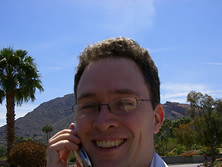 In some ways, I'm really glad I'm not (yet?) much of a blogger. I was away for three days in Arizona at a conference where I was miserably deprived of Internet access. Instead of fretting, I swam. Apart from ridiculously expensive wireless, the Camelback Inn in Scottsdale, AZ is lovely.
In some ways, I'm really glad I'm not (yet?) much of a blogger. I was away for three days in Arizona at a conference where I was miserably deprived of Internet access. Instead of fretting, I swam. Apart from ridiculously expensive wireless, the Camelback Inn in Scottsdale, AZ is lovely.I was a panelist for the 2007 Buying and Selling eContent. On Monday I told the story of how ConsumerReports.org adopted user reviews. It was a whirlwind weekend, with a preposterous amount of time spent rethinking and rewriting my presentation. I got there and immediately realized I'd pitched it to the wrong level.
So, I stayed up late on Sunday and got up early on Monday to rewrite much of it. A lot of the changes were heavily informed by a chat Michael Cheveldave gave regarding Dave Snowden's outlook on storytelling, and a long chat I had with Jill O'Neill, who I really enjoyed meeting.
For my 15 minutes, I got up, shot some video from the podium (which at the time was probably the best received part of my speech),
and launched into a story about how ConsumerReports.org added user reviews. The other presenters, Jonathan Hoy from LexisNexis, Tom Cintorino of PennWell, and Jerome Bland-Sebrien of FT.com all gave insightful talks, and pretty much rocked. Particularly after getting one question from the audience (out of about a dozen), I was convinced I'd blown it.
However, people told me later that it went okay. I just hope the new pitch of the presentation was useful to the assembled VP's and CEO's. Shannon Holman, who I had some really interesting conversations with, said nice things in her blog. So, er, thanks Shannon.
Anyway, long story short, I'm glad I went, glad I got to speak, and glad to have met so many interesting people. It also made me think a lot about the leitmotif of the conference, which was whether or not content will be free to the end user in the future.
Whether it will be or not, the conversation reminded me of something I heard some time ago about consulting. The idea is that if you have a great idea as a consultant, the best thing you can do is give it away. You're not selling your content; you're selling your expertise. I think that in a world where you can find almost always find content for free, the content providers will have to charge for services. We're moving from a buying and selling econtent, to buying and selling services related to that content. If a company can organize, filter, connect, etc. the content I can get for free, I'm going to pay for their tools.
An example of the new service economy of econtent was presented by Jim McGinty of Cambridge Information Group. His company is extracting pictures, charts, graphs and such from academic articles and indexing those as well. That's a service, at least for the time being, and I think it's a big deal. I can probably pirate the articles, but I can't search them by charts, and I can't extract the charts. If I'm trying to do meta-analysis, I'll need data - graphed or otherwise - so this service is worth paying for.
No comments:
Post a Comment